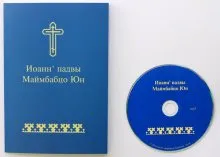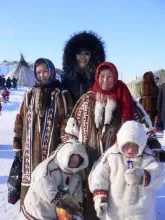
The native land of the Nenets is the tundra and the forest in the Far North of Russia (north-western Siberia, the Arctic Ocean islands and the Kola Peninsula). This is a land of permafrost and vast marshy areas. The climate is very harsh, with snow falling up to 260 days a year. The temperature can fall as low as ‑70 C in the winter. The distances between towns are vast, the population density is low, and in far northern towns alcoholism is very often rampant. It's no surprise that under these extra difficult life circumstances people do not communicate much with those whom they do not know well. Alas, sometimes even the few Christian communities prefer to live isolated and not to know much about outsiders or random strangers. Our translator, the renowned Nenets epic singer Tatiana Lar, remembers how she started seeking for God after her father’s death. In the very first church she went to, having been invited by her Siberian Tatar friend, Tatiana felt so alien and frightened by the strict looks of the long-time parishioners that her only desire was to leave as soon as possible. Another Christian church in her city was well-known for its ultraconservative outlook and unfriendly behavior, so she did not even dare to go there and see. A most sincere search for God is sometimes hampered by rigidity or fear, and a seeker may feel fully enveloped by his or her inner emptiness in the midst of a meaningless universe. That was just the case at that period of Tatiana’s life, and her initial church experience merely reflected the usual situation in most people’s everyday life.

In this cold land, where people live in isolated groups and are not used to socializing more than necessary, daring to establish relationships is a special virtue that demands strength from above. The story of our exegetical advisor Eunsub from Korea demonstrates this: “When I came to Salekhard at the end of 2000, the only way for me to hear Nenets speech was to listen to the Nenets radio. I listened to its Nenets program weekly, recorded it and listened to these records throughout the week. One of my favorite Nenets announcers was Raisa*. Her speech was clear and beautiful. Even though I had not met her yet, I started dreaming of an audio version of the Nenets Bible in her voice. Later I did meet her a couple of times at some Nenets social meetings, though it was not so easy for me to get close to her. She was deeply embedded in her own culture and very proud of it. It seemed that there was no room for me to talk to her. However, I never stopped praying for her to get involved in our Bible translation work.”
At first there was no plan to publish the Gospel of John as a separate edition. It was to be published together with the other three Gospels and the book of Acts later on. But at the reindeer festival at the end of March 2014, people from the tundra were asking about Bible texts in Nenets, and some Nenets believers were giving their offerings for the next book to be published in their language. Eunsub was open to this new circumstance. This changed the translation team's initial plan, and they decided to print John as a separate book. Tatiana Lar said that while she was translating it, she felt the strong presence of the Holy Spirit surrounding her. She managed to complete the whole translation in a relatively short time while at a Christian conference helping with the recording of Christian children's songs in Nenets.
“As we were preparing for the consultation on the

Tatiana shares how she continues to compose new Christian songs in Nenets, inspired by her Bible translation work and a renewed love for her mother tongue. When young Nenets people hear these songs they come to her and ask her to teach them. She confronts them with a question, "Aren't you afraid of being looked at as if you belong to a cult?" They are not. Attracted by the beauty of these songs in their mother tongue, they are starting their own search for the living God. Some of them are interested in the Bible translation, too. The seeds of a Christian culture in Nenets have already been sown. As for Raisa, she has recently participated in a seminar for new people beginning their work in Bible translation with IBT
IBT Russia/CIS is a non-profit organization financed through contributions from individuals, sponsoring organizations and foundations.
You can donate to IBT:
Through: AO UniCredit Bank, Moscow
SWIFT: IMBKRUMM
In favour of: Institute for Bible Translation
Address: 119334, Russia, Moscow, Andreevskaya nab. 2
TIN (INN) 7736231521
9-digit Bank identification code in Russian banking system: 044525545
Account no. (IBAN):
634261 USD 4020 02 001 or 40703840700010142881
634261 EUR 4020 02 001 or 40703978700010366720
634261 GBP 4020 02 001 or 40703826600010366723
Through: NOSTRO ACCOUNTS OF AO UNICREDIT BANK, MOSCOW:
USD JPMORGAN CHASE BANK N.A., NEW YORK SWIFT CODE: CHASUS33
EUR UNICREDIT BANK AG (HYPOVEREINSBANK) , MUNICH SWIFT CODE: HYVEDEMM
EUR UNICREDIT BANK AUSTRIA AG, VIENNA SWIFT CODE: BKAUATWW
EUR UNICREDIT S.P.A., MILANO SWIFT CODE: UNCRITMM
GBP THE ROYAL BANK OF SCOTLAND PLC, LONDON SWIFT CODE: RBOSGB2L
Important! In the field "designation" write "CHARITY DONATION"
For more information address IBT
You may sign up to receive our Russia/CIS monthly English newsletter here
